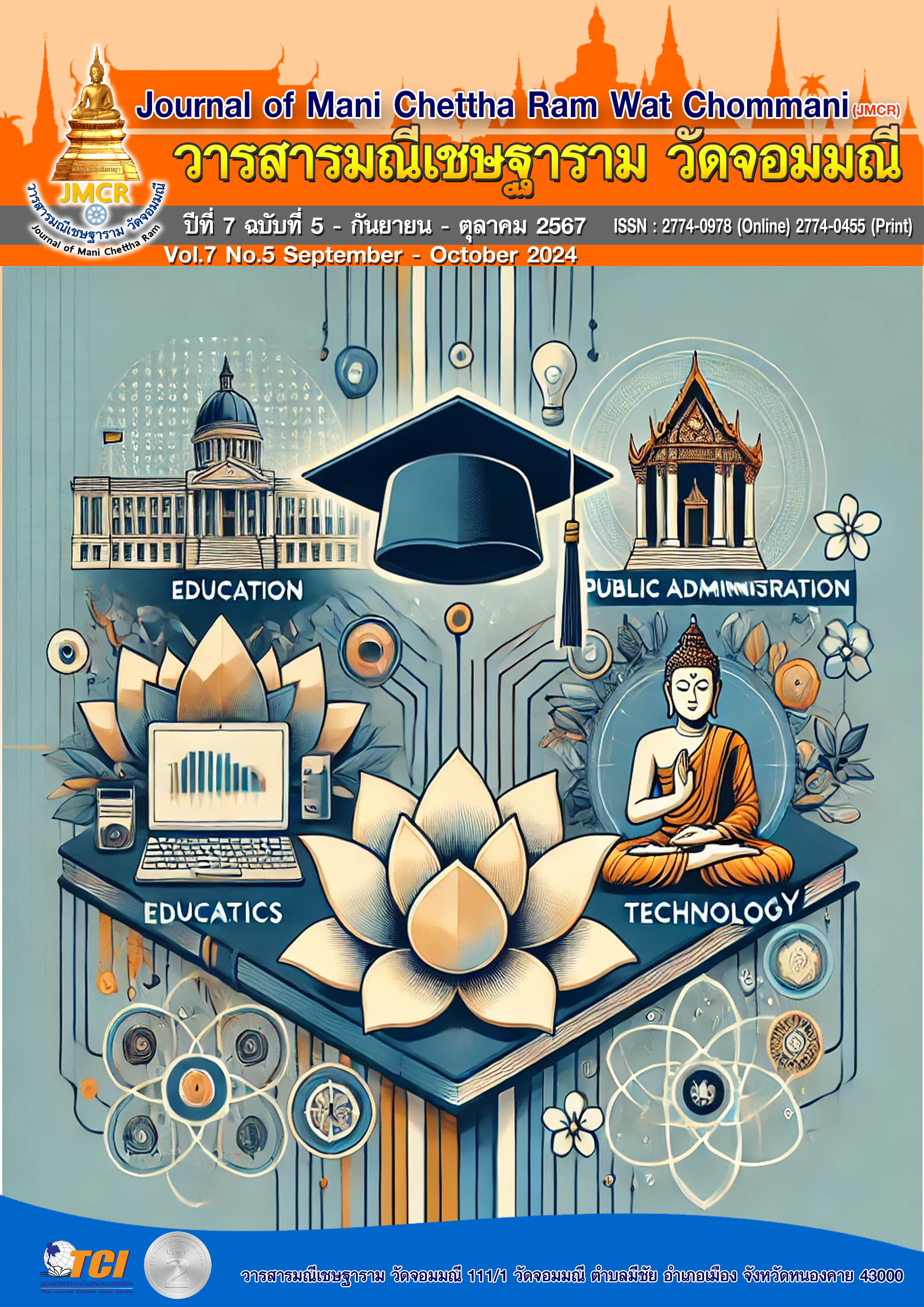MANAGEMENT of DIGITAL CULTURE of SECONDARY SCHOOLS
Keywords:
Management, Digital Culture, Secondary SchoolAbstract
This academic article focuses on the management of digital culture in secondary schools. The objectives are to explain the management of digital culture of secondary schools, including 1) studying the concept of digital culture of secondary schools 2) guidelines for managing digital culture of secondary schools. Currently, the management of educational institutions is to prepare the organization for transformation into a digital organization. Digital culture is at the heart of any organization's transformational transformation. Therefore, management allows teachers, personnel, and those involved with the organization to understand the changing way of life in the digital world and also adapt and apply the organization's original cultural guidelines, Integrated with modern digital technology and blended with traditional culture, increase flexibility, ability to innovate and grow quickly have shared values, adjusting practices to promote a digital culture and maintain the values that embody the organization is essential.
The results from the analytical study found that concepts and guidelines for managing digital culture of secondary schools should include a 4-step process: 1. Planning, 2. Organizing, 3. Commanding or Directing and
4. Controlling though elements of digital culture: 1. Having values and working together, 2. Being digitally agile and ready to accept change, 3. Ready to take digital risks and creating new things, 4. Having a digital mindset, 5. Using data to drive operations and 6. Focusing on service recipients as the center.
In this academic article, the author presents management principles for educational institution administrators with guidelines for managing the digital culture of secondary schools as follows: 1) Set operational guidelines that encourage personnel to constantly try new things, 2) Foster a growth mindset, promoting learning, problem-solving, and development from opportunities that support work advancement, 3) Encourage teamwork, openness to learning, and knowledge exchange while maintaining traditional practices in harmony with digital culture values, 4) Promote personnel participation in expressing opinions and creating collaborative agreements or working conditions, 5) Design a clear monitoring and supervision system for every step of the work process through technology, 6) Innovate to provide customer service that exceeds standards, and 7) Focus on current customers while anticipating future customer groups, setting a framework for expected outcomes.
References
กองกฎหมายการศึกษาและวัฒนธรรม.(2562) เจตนารมณ์พระราชบัญญัติพื้นที่นวัตกรรมการศึกษา พ.ศ.2562. (พิมพ์ครั้งที่ 1). กรุงเทพมหานคร: สำนักงานคณะกรรมการกฤษฎีกา.
ชัยพัชร์ เลิศรักษ์ทวีกุล. (2567). 3 วิธีสร้าง DIGITAL CULTURE ในองค์กร MULTI GENERATION. เรียกใช้เมื่อ 28 กรกฎาคม 2567. จาก https://deoneacademy.com/how-to-create-digital-culture-in-multi-genaration/
ธนชาติ นุ่มนนท์. (2562, 22 มีนาคม). กลยุทธ์: สู่ความสำเร็จด้านดิจิทัลดิจิทัลทรานส์ฟอร์เมชั่น. กรุงเทพธุรกิจ. เรียกใช้เมื่อ 22 มีนาคม 2567. จาก https://www.bangkokbiznews.com/ blog/detail/646871.
นิรุติ เต้นปักษี. (2565). รูปแบบการพัฒนาวัฒนธรรมดิจิทัลของสถานศึกษาขนาดใหญ่พิเศษ สังกัดสำนักงานเขตพื้นที่การศึกษามัธยมศึกษาบุรีรัมย์. ในวิทยานิพนธ์ปริญญาศึกษาศาสตรมหาบัณฑิต สาขาการบริหารการศึกษา. มหาวิทยาลัยขอนแก่น.
ปกรณ์ วงศ์รัตนพิบูลย์. (2559). ภาวะผู้นำ. เรียกใช้เมื่อ วันที่ 15 พฤษภาคม 2561. จาก http://www.entraining.net/article06_leadership.php
ประพันธ์ คชแก้ว. (2562). นวัตกรรมการบริหารองค์ในยุคดิจิทัล Innovation of Organization Administration in Digital Age. เรียกใช้เมื่อ 16 พฤศจิกายน 2566. จาก: file:///C:/ Users/ ASUS%20ZenBook/Downloads/172467-Article%20Text-646535-2-10- 20190809%20(1).pdf.
ปรียาพร วงศ์อนุตรโรจน์. (2553). การบริหารงานวิชาการ. (พิมพ์ครั้งที่ 1). กรุงเทพมหานคร: ศูนย์สื่อเสริมกรุงเทพ.
ฟารียะ สะอุ. (2562). ความสัมพันธ์ระหว่างวัฒนธรรมองค์การกับระสิทธิผลของโรงเรียน สังกัดสำนักงาน พื้นที่การศึกษาประถมศึกษายะลา เขต 3. ในสารนิพนธ์ศึกษาศาสตรมหาบัณฑิต สาขาวิชาการบริหารการศึกษา. มหาวิทยาลัยหาดใหญ่.
มนทิพย์ ทรงกิติพิศาล. (2552). ปัจจัยที่ส่งผลต่อประสิทธิผลการบริหารสถานศึกษาขั้นพื้นฐานระดับมัธยมศึกษาในพื้นที่ภาคใต้ของประเทศไทย. ใน ดุษฎีนิพนธ์ปริญญาดุษฎีบัณฑิต. การบริหารการศึกษา. มหาวิทยาลัยรามคำแหง.
ลิขิต ศรีแสนชัย. (2560). มาตรฐานองค์กรในยุค 4.0 Organization Standards In The 4.0 Era. เรียกใช้เมื่อ 28 กรกฎาคม 2567. จากfile:///C:/Users/ASUS%20ZenBookDownloads/240239-Article%20Text-823832-1-10-20200301%20(1).pdf
วิทยาธร ท่อแก้ว. (2562). การออกแบบนโยบายและนวัตกรรมการสื่อสารนโยบายการพัฒนาท้องถิ่น. ศูนย์วิจัยและพัฒนาการสื่อสารทางการเมือง. (พิมพ์ครั้งที่ 1). นนทบุรี:มหาวิทยาลัยสุโขทัยธรรมาธิราช
วิรัช สงวนวงศ์วาน. (2547). การจัดการและพฤติกรรมองค์การ. (พิมพ์ครั้งที่2).กรุงเทพมหานคร: เพียร์สัน. เอ็ด.
วสิษฐ แต้ไพสิฐพงษ์. (2564). Betagro 360 Transformation การเปลี่ยนแปลงก้าวสำคัญของบริษัทเบทาโกร จำกัด (มหาชน) สู่สังคมดิจิทัลด้วยนวัตกรรมเพื่อยกระดับมาตรฐานความปลอดภัยทางอาหารและความอร่อยที่เหนือระดับ พร้อมทางเลือกที่หลากหลายแก่ผู้บริโภค. เรียกใช้เมื่อ 28 กรกฎาคม 2567 จาก https://www.betagro.com/th/management/board-ofdirectors/25/mr-vasit-taepaisitphongse เพียร์สัน เอ็ดดูเคชั่น อินโดไชน่า.
วิโรจน์ สารรัตนะ. (2555). แนวคิด ทฤษฎีและประเด็นเพื่อการบริหารทางการศึกษา. (พิมพ์ครั้งที่ 8). กรุงเทพมหานคร: ทิพยวิสุทธิ
________. (2557). ภาวะผู้นำ : ทฤษฎีและนานาทัศนะร่วมสมัยปัจจุบัน. (พิมพ์ครั้งที่ 1). กรุงเทพมหานคร: ทิพยวิสุทธิ.
สันติ บุญภิรมย์. (2552). การบริหารงานวิชาการ. (พิมพ์ครั้งที่ 1). กรุงเทพมหานคร: บุ๊ค พอยท์.
สายพิณ ปั้นทอง. (2563). กลยุทธ์การจัดการรูปแบบการทำงานเพื่อการพัฒนาสู่องค์ยุคใหม่. เรียกใช้เมื่อ 16 พฤศจิกายน 2566จากhttps://publication.npru.ac.th/bitstream/123456789/1161/1/%e0%b8%ad%e0%b8%9a%e0%b8%95.pdf.
สำนักงานคณะกรรมการการศึกษาแห่งชาติ. (ม.ป.ป.). พระราชบัญญัติการศึกษาแห่งชาติ พ.ศ. 2542 และที่แก้ไขเพิ่มเติม (ฉบับที่ 2) พ.ศ. 2545. กรุงเทพมหานคร: พริกหวานกราฟฟิค.
สำนักงานคณะกรรมการการศึกษาขั้นพื้นฐาน. (2565). แผนพัฒนาการศึกษาขั้นพื้นฐาน (พ.ศ. 2566- 2570). (พิมพ์ครั้งที่ 1 ) กรุงเทพมหานคร: กระทรวงศึกษาธิการ.
สุจินต์ วิศวธีรานนท์. (2546). เอกสารการสอนชุดวิชาพฤติกรรมการสอนมัธยมศึกษา. (พิมพ์ครั้งที่ 1). นนทบุรี. มหาวิทยาลัยสุโขทัยธรรมาธิราช.
สุนทร วงศ์ไวศยวรรณ. (2550). วัฒนธรรมองค์กร แนวคิด งานวิจัย และประสบการณ์. (พิมพ์ครั้งที่ 1). กรุงเทพมหานคร: สำนักพิมพ์ โฟร์เพช,
สุระพันธ์ ฉันทะแดนสุวรรณ. (2553). หลักการบริหารธุรกิจ. (พิมพ์ครั้งที่ 5). กรุงเทพมหานคร: จุดทอง.
อรรถพล ประภาสโนบล. (2559). วิพากษ์วัฒนธรรมดิจิตอลผ่านปรัชญาการศึกษาของเปาโล แฟร์. วารสารปณิธาน. 12(1), 78-82.
อัจฉรา จุ้ยเจริญ. (2560). วัฒนธรรมองค์กรยุคดิจิทัล. เรียกใช้เมื่อ 28 กรกฎาคม 2567 จาก: https://www.posttoday.com/aec/column/513359?fbclid=IwAR1v
เอกชัย กี่สุขพันธุ์. (2538). การบริหาร ทักษะและการปฏิบัติ(พิมพ์ครั้งที่ 3). ไทยวัฒนาพานิช.
เศรษฐพงค์ มะลิสุวรรณ. (2560). The year of disruption. เรียกใช้เมื่อ 28 กรกฎาคม 2567 จาก http://tct.or.th/images/Article/ special_article/25610110/198410_disruption.pdf.
Bartol, M. K., and Martin, C. D. (1998). Management (3rd ed.). McGraw-Hill.
Deming in Mycoted. (2004). Plan Do Check Act (PDCA) (Online). Retrieved July 28, 2024, from http://www.mycoted.com/creativity/techniques/pdca.php
Gere, C. (2008). Digital culture (2nd ed.). Reaktion Books.
Herbert A. Simon. (1976) Administrative Behavior, 3 rd ed. New York :The Free Press.
Kaplan, J. (2015). Learning from Google’s digital culture. Retrieved July 12, 2024, From https://shorturl.asia/Gwe5f
Perter Drucker. (1998.) Perter Ducker on the Profession of Management. New York.
Sean Michael Kerner. (2022) What is digital culture and why is it important? Retrieved February 10, 2024 From www.techtarget.com
Sean Michael Kerner. (2024). Digital culture Retrieved July 28, 2024, From. https://www.techtarget.com/searchcio/definition/digital-culture
Snyder, C. R., & Lopez, S. J.(2007) Research on Apple Inc’s Current Developing Conditions Retrieved July 28, 2024, From Http://www.scirp.org/reference/referencespapers? referenceid=2319737
Steps Academy. (2019). Culture Organization and Personnel in Digital Era. Retrieved July 12, 2024, From https://stepstraining.co/foundation/team-culture-and-
Udapudi, A. (2019). What is digital culture and why it should matter to you. Retrieved May 8, 2024, From https://shorturl.asia/0J8sf.
World Economic Forum. (2021). Digital culture: the driving force of digital transformation. (n.p.)




